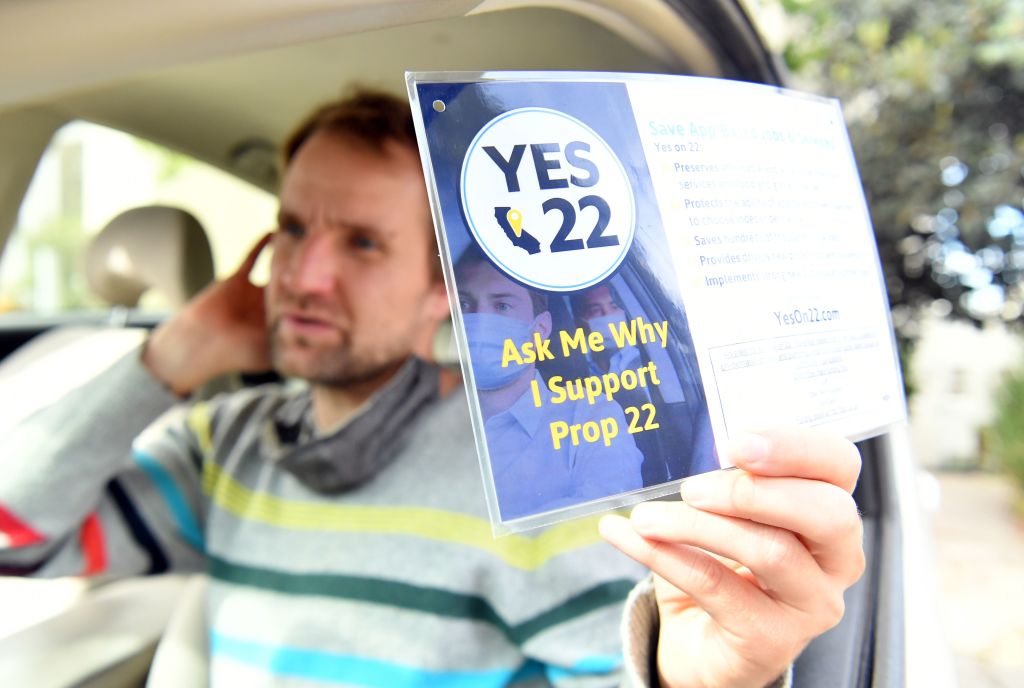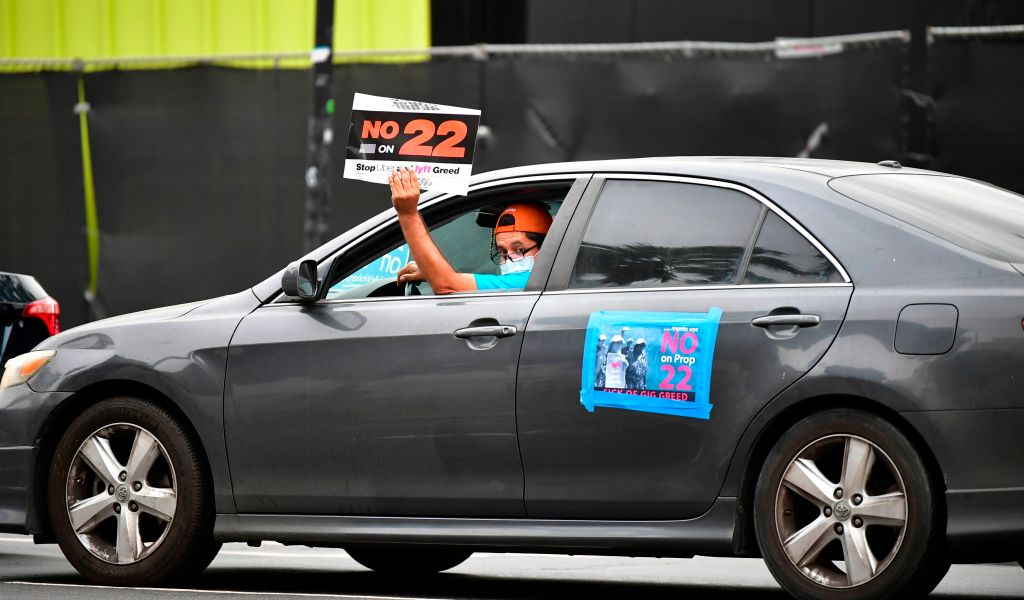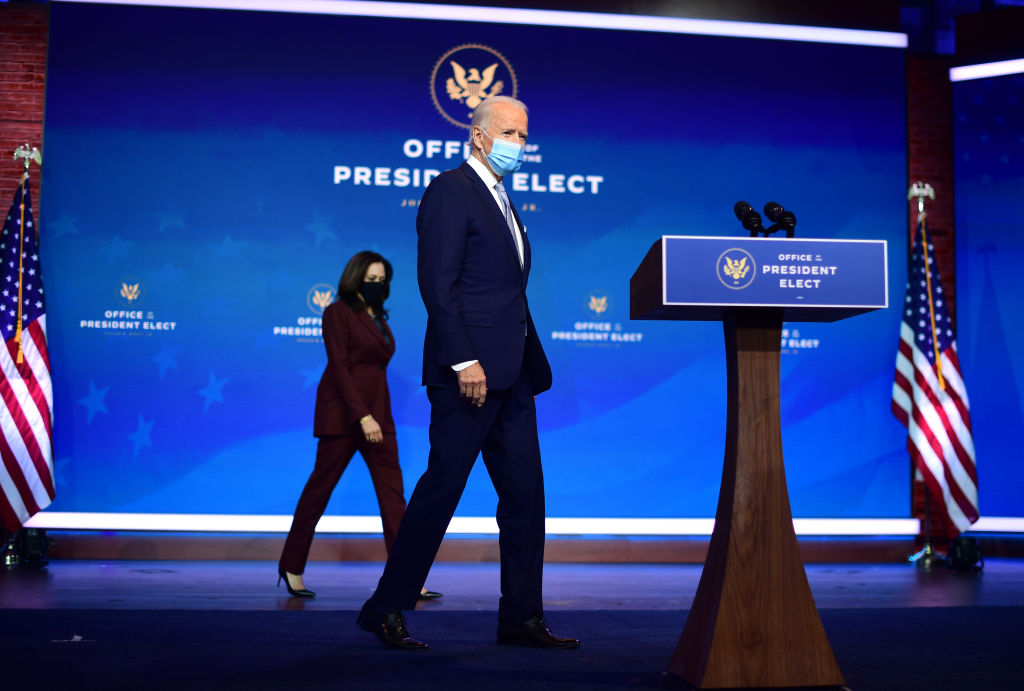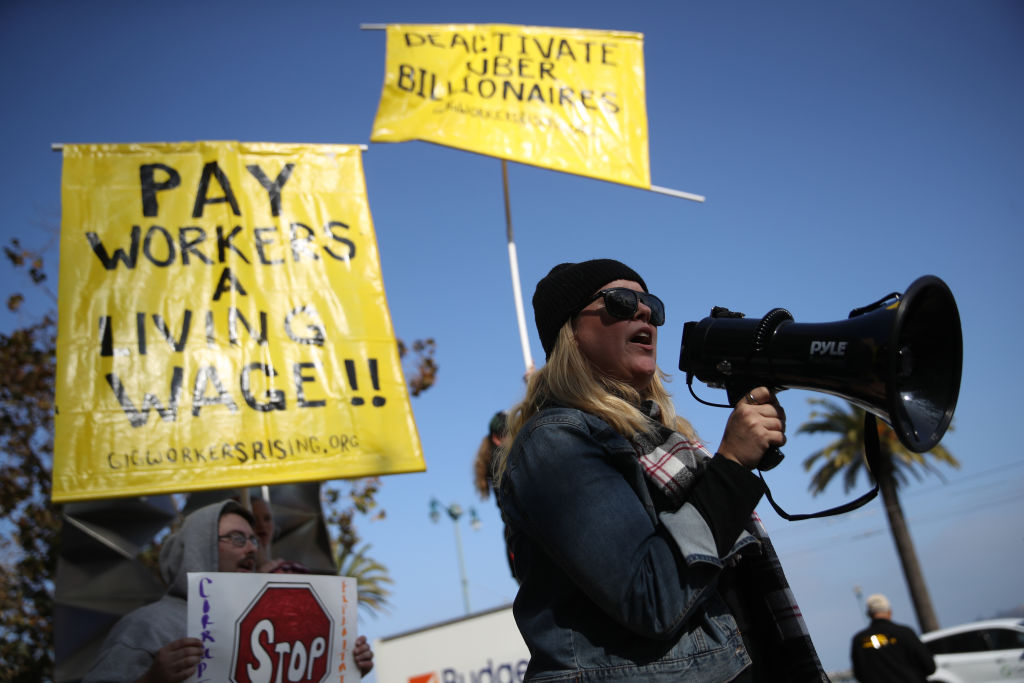When California voters passed Proposition 22 with 58.6% of the vote, they agreed with Uber, Lyft, DoorDash, Instacart and Postmates that gig workers should not be employees who are entitled to myriad labor rights. The proposition they passed stated that gig workers should be independent contractors who receive the limited benefits proposed by those companies.
“The first feeling I had was shock, disbelief and hurt,” Vanessa Bain, a worker-organizer with Gig Workers Collective, told TechCrunch. “It didn’t feel good to think that my fellow Californians voted to strip people like myself and my co-workers of our labor rights.”
But Prop 22 does not mark the end of the battle of the status of gig workers. Gig workers, lawyers and activists affiliated with Gig Workers Rising, Gig Workers Collective, the National Employment Law Project and the Partnership for Working Families are all gearing up to redouble their efforts in the New Year. But the same goes for gig companies. Uber and Lyft are ready to take legislation similar to Prop 22 into other parts of the country and the world.
“We didn’t have time for more grieving because as soon as it passed, every company signaled they’re looking to expand this model to the national level, which means our organizing needs to adjust accordingly,” Bain said.
So, really, the fight has just begun. In the year ahead, we will likely see lobbying efforts from both gig companies and gig worker organizations alike, as well as more lawsuits.
In 2019, the California state legislature passed Assembly Bill 5, which became law in January 2020.
AB 5 mandated that companies apply the ABC test to determine how to classify their workers. According to the ABC test, in order for a hiring entity to legally classify a worker as an independent contractor, it must prove the worker:
- A — is free from the control and direction of the hiring entity.
- B — performs work outside the scope of the entity’s business, and
- C — is regularly engaged in an “independently established trade, occupation or business of the same nature as the work performed.”
Many have argued that gig economy companies do not pass the ABC test, while the companies themselves have, of course, argued that they do. As AB 5 made its way through the state legislature, gig companies banded together with their competitors to fight a collective enemy: labor rights for their respective workforces.
In August 2019, Uber and Lyft kicked off that fight with an initial $60 million put toward the ballot measure now known as Prop 22. Between August 2019 and November 2020, that number skyrocketed to around $205 million and brought in contributions from other companies like Postmates (now owned by Uber), Instacart and DoorDash. All that funding makes Proposition 22 the most expensive ballot measure in California since 1999.

On the other side, major donors in opposition of Prop 22 included Service Employees International Union, United Food & Commercial Workers and International Brotherhood of Teamsters. They collectively contributed $15.9 million.
The ballot measure, which goes into effect this month, implements a few key benefits:
- An earnings guarantee of at least 120% of minimum wage while picking up or dropping off passengers or items
- 30 cents per engaged mile for expenses.
- A healthcare stipend.
- Occupational accident insurance for on-the-job injuries.
- Automobile accident and liability insurance.
Ahead of the Prop 22 vote, Cherri Murphy, a ride-share driver for Uber and Lyft and lead organizer at Gig Workers Rising, was heavily involved in Gig Workers Rising’s efforts to combat the millions of dollars tech companies put into ensuring gig workers would be classified as independent contractors.
“We had a hell of a fight,” Murphy told TechCrunch. “We were up against a $205 million campaign but I still had to believe that we could win.”

Despite the passage of Prop 22, Murphy and her counterparts are ready to continue the fight.
“This is my life so I will continue to organize and bring together thousands of drivers across the state and nationwide,” Murphy said.
It’s also important to understand that there is nothing in Prop 22 that explicitly allows it to apply retroactively, Ray Fuentes, a legal fellow at The Partnership for Working Families, told TechCrunch.
“It’s fair to say that ongoing public enforcement along with private action people might bring is fair game as workers are owed back wages that the law required the company to cover,” Fuentes said. “I think that’s important because a lot of folks have the impression now that these companies have escaped all liability.”
Since the passage of Prop 22, we’ve already seen Uber and Lyft fail to convince a California court to rehear a decision regarding a preliminary injunction. In November, a judge denied Uber and Lyft’s petitions for rehearing regarding the preliminary injunction affirmed in October. That injunction is part of a lawsuit brought forth by California Attorney General Xavier Becerra and a handful of the state’s city attorneys alleging, in light of the implementation of AB 5, both Uber and Lyft were misclassifying its employees.
Gig Workers Rising also plans to carefully audit whether these companies follow through on their guarantees for healthcare subsidies and minimum wage.
“We need to make sure we hold them accountable across the state,” Murphy said. “We know racial justice is economic justice. The system that promotes the killing of Black people is the same system that promotes the exploitation of Black and brown workers. And Uber, Lyft and DoorDash are experts at that.”
The Partnership for Working Families also plans to monitor how gig economy companies comply with the new law they put forth.
“They made a lot of statements through the Prop 22 campaign about caring for workers and they should live up to that,” Fuentes said. “Workers are interested in holding companies accountable to their promises made under Prop 22 as well as the rhetoric. We’re going to be comparing what happens on the ground to what companies said was going to happen.”
While The Partnership for Working Families is not explicitly working on this, Fuentes said some are considering legal challenges to try to limit the reach of Prop 22.
“That’s something that is clearly being considered by advocates on the ground,” he said. “Any sweeping changes to the law invites investigation into whether that sweeping change is lawful and constitutional under California law.”
Over at Rideshare Drivers United, a coalition of around 20,000 drivers throughout California, a big focus is similarly on the enforcement of Prop 22.
“That’s going to be a very important piece for the state to figure out — how they’re enforcing Prop 22,” RDU driver-organizer Nicole Moore told TechCrunch. “But we also don’t want this kind of exemption to spread like a cancer throughout the country.”
Given that California is in the middle of another shutdown due to the COVID-19 pandemic, RDU is focused on helping drivers who are about to be cut off from pandemic unemployment assistance on Dec. 26, 2020. But if drivers had been classified as employees, they would be eligible for regular unemployment assistance.
“That’s why it’s so infuriating to me that here we are and drivers are about to be cut off from PUA and it’s supposed to be unemployment,” Moore said. “I’m so concerned about what drivers are going through who are dependent on PUA. I tell them go to EDD and tell them you were misclassified and were supposed to be on unemployment. Those are the kinds of things we’re working on right now because no one else is working on it.”

At the federal level, President-elect Joe Biden has promised to “ensure workers in the ‘gig economy’ and beyond receive the legal benefits and protections they deserve,” his site states. The administration goes on to describe how gig workers are misclassified and therefore deprived of their rightful benefits and protections.
“This epidemic of misclassification is made possible by ambiguous legal tests that give too much discretion to employers, too little protection to workers, and too little direction to government agencies and courts,” the site states.
Moving forward, Biden, who was anti-Prop 22, says he will work with Congress to create a federal standard that is modeled on the ABC test.
Whether Biden follows through with that promise, however, has yet to be seen. It’s worth noting that while Vice President-elect Kamala Harris’ brother-in-law, Tony West, is head of legal at Uber, Harris was anti-Prop 22.
“So we need to continue to hold light to their words and make sure they follow through on that,” Murphy said. “We’re just going to continue organizing.”
“I have a morsel of optimism about a Biden administration over a Trump one but it’s not something I feel optimistic about either,” Bain said. “I think there is a very real scenario in which we’re going to be fighting, as workers, a battle against things at the national level, at the state level and at the company level as well. We are going to have to be like juggling a hundred balls at once.”
The Partnership for Working Families is also looking at lobbying federal policy makers and advocating against the proposed rule regarding independent contractors. In May 2019, National Labor Relations Board General Counsel Peter Robb, a Trump appointee, said in a memo that Uber drivers are contractors rather than employees. Once Biden appoints a new general counsel, Fuentes is hoping the NLRB will reverse that stance.
“We plan to communicate to federal policy makers that this third way of classification is not as glamorous as one would suspect,” Fuentes said. “Our working hypothesis is that it may not work out in the way companies envisioned.”
Uber and Lyft have their eyes on pursuing Prop 22-like legislation elsewhere. Given Uber and Lyft’s anti-gig-workers-as-employees stance, it came as no surprise when Uber and Lyft separately said they would pursue similar legislation in other parts of the country and the world. On an Uber earnings call, Uber CEO Dara Khosrowshahi said the company will “more loudly advocate for laws like Prop 22.” He added that a priority of the company will be to work with both national and international governments “to make this a reality.”
After Prop 22’s passage, Uber is taking its lobbying effort global
Lyft’s leadership made similar statements. On the company’s earnings call, CEO Logan Green said it would pursue Prop 22-like legislation in other states. But the next major election isn’t until 2022, and it’s unlikely Lyft and Uber will wait that long. When asked for specifics about what we could expect, Uber said it didn’t have any new details to share about its plans, but pointed to its previously published priorities. Lyft did not return TechCrunch’s request for comment.
Over at the National Employment Law Project, its group of attorneys are gearing up for a legislative push from companies like Uber and Lyft as we head into the new year.
“I think what they’re going to do is take the Proposition 22 model — this unprecedented package of corporate backed anti-worker laws and bring it as legislation — not as a ballot initiative — and rebrand it as ‘independent contractor plus’ and bring it to state legislatures,” NELP Staff Attorney Brian Chen told TechCrunch. “It’s clear they’re calling it ‘independent contractor plus’ — trying to put a nice gloss on it. But past the corporate spin, they’re trying to exclude more and more workers form our basic workplace protections.”
Chen added, “We already know these companies and their lobbyists — they’ve been meeting with lawmakers and creating sham op-ed groups to say economic stability relies on independent work.”
Lyft, for example, has created external organizations that push for the independent contractor classification. Two of those organizations are Illinoisans for Independent Work and New Yorkers for Independent Work. Illinoisans for Independent Work was established in June and funded by Lyft with $1.2 million, according to committee filings. The stated purpose of the committee is “to support candidates who share the ideology of our organization and the value of independent work.”
New Yorkers for Independent Work is similarly funded by Lyft. To date, Lyft has loaned the committee $1.25 million, according to the committee’s financial disclosures. Lyft made its first loan contribution in June, followed by another one in September.
Moving forward, it’s hard to predict where companies like Uber and Lyft will go next, Chen said, but it’s likely they’ll want to go to big markets.
“Places where they know there’s been on-the-ground workers organizing and activists they’d finally like to stomp out, and where enforcement has been strong against the company,” he said.
Chen pointed to New York, Illinois, Massachusetts, New Jersey, Colorado, Pennsylvania, Washington, Oregon and Michigan. Wherever these companies bring the battle next, Chen says NELP will be heavily involved in fighting back.
And NELP won’t be alone. Already, Bain says she and her comrades at GWC have already been in touch with several state attorney general offices as well as state-level labor departments about their laws.
“We already know companies are doing this proactively, so we need to be doing this proactively as well,” Bain said. “I think there is a lot we are going to be up against. It depends on some of the people who are appointed in labor positions and what their actual principles and values are, but I’m a little more optimistic. Things that were not possible to do under Trump will just be really difficult to do under Biden, but not impossible.”































Comment